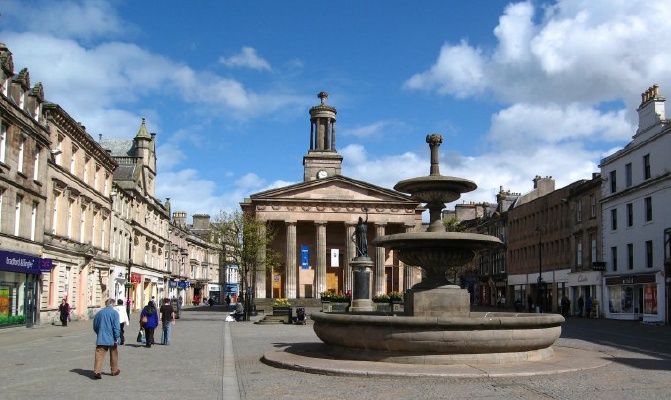The Elgin – Forres – Lossiemouth triangle is heavily dependent on the Royal Air Force stations for its employment of civilians. In 2005, RAF Lossiemouth along with its neighbour RAF Kinloss contributed £156.5 million (including civilian expenditure) to the Moray economy, of which £76.6 million was retained and spent locally. The bases are responsible for providing, directly or indirectly, 21 per cent of all employment in the area. Other areas offering significant employment are local authority, construction and real estate, food and drink, tourism, transport, business services and wholesale/retail.
In a recent study, Elgin was shown to be one of the most expensive towns in which to buy property in Scotland.

In the third month after the Israelites left Egypt—on the very day—they came to the Desert of Sinai. After they set out from Rephidim, they entered the Desert of Sinai, and Israel camped there in the desert in front of the mountain.
Then Moses went up to God, and the LORD called to him from the mountain and said, "This is what you are to say to the house of Jacob and what you are to tell the people of Israel: 'You yourselves have seen what I did to Egypt, and how I carried you on eagles' wings and brought you to myself. Now if you obey me fully and keep my covenant, then out of all nations you will be my treasured possession. Although the whole earth is mine, you will be for me a kingdom of priests and a holy nation.' These are the words you are to speak to the Israelites."
So Moses went back and summoned the elders of the people and set before them all the words the LORD had commanded him to speak. The people all responded together, "We will do everything the LORD has said." So Moses brought their answer back to the LORD.
The LORD said to Moses, "I am going to come to you in a dense cloud, so that the people will hear me speaking with you and will always put their trust in you." Then Moses told the LORD what the people had said.
And the LORD said to Moses, "Go to the people and consecrate them today and tomorrow. Have them wash their clothes and be ready by the third day, because on that day the LORD will come down on Mount Sinai in the sight of all the people. Put limits for the people around the mountain and tell them, 'Be careful that you do not go up the mountain or touch the foot of it. Whoever touches the mountain shall surely be put to death. He shall surely be stoned or shot with arrows; not a hand is to be laid on him. Whether man or animal, he shall not be permitted to live.' Only when the ram's horn sounds a long blast may they go up to the mountain."
After Moses had gone down the mountain to the people, he consecrated them, and they washed their clothes. Then he said to the people, "Prepare yourselves for the third day. Abstain from sexual relations."
On the morning of the third day there was thunder and lightning, with a thick cloud over the mountain, and a very loud trumpet blast. Everyone in the camp trembled. Then Moses led the people out of the camp to meet with God, and they stood at the foot of the mountain. Mount Sinai was covered with smoke, because the LORD descended on it in fire. The smoke billowed up from it like smoke from a furnace, the whole mountain trembled violently, and the sound of the trumpet grew louder and louder. Then Moses spoke and the voice of God answered him.
The LORD descended to the top of Mount Sinai and called Moses to the top of the mountain. So Moses went up and the LORD said to him, "Go down and warn the people so they do not force their way through to see the LORD and many of them perish. Even the priests, who approach the LORD, must consecrate themselves, or the LORD will break out against them."
Moses said to the LORD, "The people cannot come up Mount Sinai, because you yourself warned us, 'Put limits around the mountain and set it apart as holy.' "
The LORD replied, "Go down and bring Aaron up with you. But the priests and the people must not force their way through to come up to the LORD, or he will break out against them."
So Moses went down to the people and told them. (Exodus 19.1-25)
When God of old came down from heaven,
in power and wrath he came;
before his feet the clouds were riven,
half darkness and half flame:
But when he came the second time,
he came in power and love;
softer than gale at morning prime
hovered his holy Dove.
The fires, that rushed on Sinai down
in sudden torrents dread,
now gently light, a glorious crown,
on every sainted head.
And as on Israel's awestruck ear
the voice exceeding loud,
the trump that angels quake to hear,
thrilled from the deep, dark cloud;
So, when the Spirit of our God
came down his flock to find,
a voice from heaven was heard abroad,
a rushing, mighty wind.
It fills the Church of God; it fills
the sinful world around;
only in stubborn hearts and wills
no place for it is found.
Come Lord, come Wisdom, Love and Power,
open our ears to hear;
let us not miss the accepted hour;
save, Lord, by love or fear.
Words: John Keble, 1827

No comments:
Post a Comment